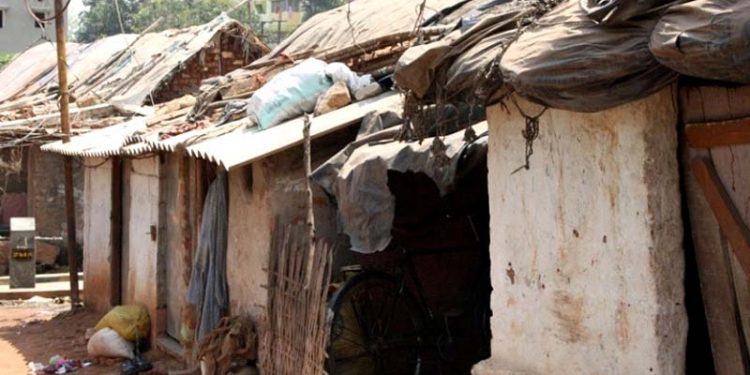Bhubaneswar: When the Centre announced unlocking measures, a 36-year-old Manoranjan Behera (name changed) of Ganjam decided to move to Bhubaneswar as soon he came to know of a construction firm hiring workers.
Left with no work and money for three months, Manoranjan moved to the capital city in early June and decided to stay with his younger brother who resided in slums of Trinatha Basti here. As per government instructions, Manoranjan who came from a Covid-19 hotspot put himself in home quarantine for 14 days.
However, only after a few days of his arrival, Manoranjan started experiencing diarrhoea and high fever. He was soon taken to the hospital and later found Covid positive. A week later, his brother’s wife was also found positive and soon the Bhubaneswar Municipal Corporation (BMC) declared the slum a containment zone.
Cases such as Manoranjan’s are a few of many in the city that have soared the city’s Covid numbers with the pandemic gradually spreading its fangs to the slums of the capital. As per BMC reports, out of 442 slums in the city, over 40 have been affected with the virus and about 10 major slums including Salia Sahi, Halidipadia, Maa Mangala Basti and Mahisakhai Basti have reported community spread cases.
Blaming the increase partly on people and largely on the authorities, Anjan Nath, a social activist who has been assisting the slum dwellers in fight against the pandemic said the BMC is “acting too little and too late.”
“The civic authority’s awareness campaigns have been a failure. Reaching door to door is the key to make aware the slum dwellers. Even though BMC deployed Sachetak members and slum communities, lack of coordination between the members and the BMC has lead to increase in cases. Furthermore, the BMC’s order for institutional quarantine of slum returnees came in much later when the damage had been done,” Nath said.
Nath’s claims can be testified from the fact when the BMC in an order, June 27, announced compulsory 14-day institutional quarantine for those returning to the city slums from other Covid hotspots of the state. The order had only come after 16 cases in the city were reported a day earlier which included a 50-year-old female from Abhiram slum in Sundarpada which the BMC termed ‘a local’ but failed to establish any contact of infection.
Moreover, apart from shortage of space in slum areas for social distancing, Nath also highlighted the fact that the home quarantine of suspected cases is unlikely as they lack proper access to toilets and food. “Unless they are provided with regular supply of meals and other necessities, they have to go out and other places – defeating the very purpose of home quarantine.”
Responding to this, BMC Commissioner Prem Chandra Chaudhary said, “Most of the cases have travelling history or are contact of earlier positive cases. They were taken to institutional quarantine and then found positive. Moreover, under the sero-surveillance a total of 43,000 people from 11,000 families in the slums are being surveyed on a daily basis. This is an evolving situation and we are concerned for the welfare of city denizens.”
Aviral Mishra, OP






































